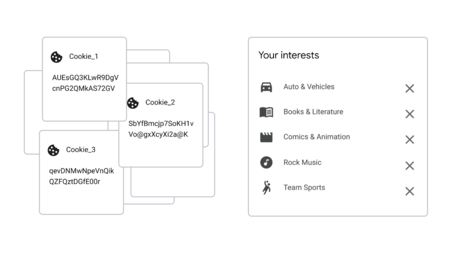Google says goodbye to the criticized FLoC and presents Topics, its new proposal to eradicate cookies

Google has presented Topics, a proposal that replaces FLoC (Federated Learning of Cohorts), the interest-based advertising system that it proposed last year as a replacement for cookies and that promised to improve user privacy.
The Mountain View giant says it has taken into account lessons learned and user feedback regarding FLoC to develop a new personalized advertising system within your initiative Privacy Sandbox.
Themes that represent the interests of users
Google explains that with Topics the browser define locally —and without the intervention of an external server— a series of themes, such as “fitness” or “travel”, which represent the most prominent interests of the user in that week according to their browsing history.
In this way, when the user visits a web page that supports the Topics API, it receives three topics corresponding to the last three weeks. Site administrators, for their part, will be able to say whether they share that advertising information with their advertisers.
In order to provide greater control and transparency to the user, point from google, Topics will have controls that will allow you to remove themes directly from the browser or disable the feature altogether.

The system currently has 300 themes, but Google plans to expand that number over time. However, they point out avoid the themes of potentially sensitive categories such as race or gender.
In relation to privacy, the Mountain View company mentions that Topics offers advertisers an option that does not involve covert tracking techniques, such as browser fingerprint, to present relevant ads.
Will Topics have the success that FLoC didn’t?
At the moment, the company has posted on GitHub the technical details of its new proposal which, as mentioned above, will replace FLoC. Google notes that Topics will start working “soon” on a trial basis in Chrome.
Those of the search engine have been trying to change how ads work on the Internet for a long time. As part of their ambitious plan, they had established a roadmap in which, after two phases, in 2023 they would say goodbye to cookies in Chrome.

Google proposed FLoC, a system that, unlike cookies that track user activity on the web to provide it to advertisers, was based on the common interests that replaced individual identifiers.
However, some industry players, such as the DuckDuckGo search engine and the Brave browser, have spoken out against FLoC. This was followed by an investigation by the European Commission, which hindered the plans of the Mountain View company.
For now, it remains to be seen what the response of users and the sector will be to this new alternative. It must be remembered that Google obtains a large part of its income from digital advertising and that the success of this type of system is very important for its business model.
Image | Google
Reference-www.xataka.com